- Home
- Tim Powers
Three Days to Never Page 3
Three Days to Never Read online
Page 3
There was a pause, then Malk said, “I thought it was daylight here too.”
“Well I think it’s…brighter, here. Now. We got another installment from the ether. I think more is going on here than where you were going.”
“I probably can’t get a refund on the ticket.”
“Screw the ticket. You need to hear Sam’s new tape.”
“Ala bab Allah,” sighed Malk.
Lepidopt laughed at the ironic use of the Arabic phrase—it meant, more or less, “What will be will be.” “So get back here now. Full APAM dry-cleaning while you’re driving too—stops and double backs, watch for multiple cars, and if you can even see a helicopter, drive on by and lose the car.”
“Okay. Don’t start the John Wayne stuff till I get there.”
Lepidopt’s elbows jerked in against his ribs in a sudden shudder.
The line went dead, and Lepidopt’s face was cold as he replaced the receiver in its cradle.
Don’t start the John Wayne stuff till I get there. Bert, Bert, he thought, so carelessly and unknowingly you shorten my life! Or show me a new, even closer boundary of it, anyway.
He made himself take a deep breath and then let it out.
The faint clicking of the keyboard had stopped. “You were laughing,” said young Ernie Bozzaris from the table in the kitchen, “and then you look as if you saw a demon. What did he say?”
Lepidopt waved his left hand in a dismissive gesture. “I shouldn’t have borscht for lunch,” he said gruffly. “He’s coming back here, not getting on the plane. Should be here in half an hour or less.” Suddenly self-conscious, he slid his maimed right hand into his pocket.
Bozzaris stared at him for another moment, then shrugged and returned his attention to his computer monitor. He was in his late twenties, fresh from the Midrasha academy; there was no gray in his black hair yet, and though he shaved several times a day, his lean jaw always seemed to be dark. “It’s not the borscht,” he said absently, “it’s the Tabasco you pour into it.”
With his left hand Lepidopt shook out another Camel from the pack, then used the same hand to snap his lighter at it. He inhaled deeply—it seemed even less likely now that he would have time to die of cancer. He had always heard the saying, You’re scared until the first shot. And that had proved true twenty years ago, in Jerusalem. For a little while, at least.
He sighed. “Any activity?” he asked as he stood up and carried his coffee cup to the kitchen. His shoes were as silent on the kitchen’s linoleum floor as they had been on the carpet in the living room.
Bozzaris had hung his gray linen sport coat over the back of the plastic chair and rolled up his sleeves.
“No unusual activity,” he said, not looking away from the dark green monitor screen and the bright green lines of type scrolling upward, “But we don’t know who else is out there. The one in New Jersey who tried to get into the mainframe Honeywell in Tel Aviv an hour ago uses the Unix disk-operating system on a Vax machine, and, like everybody else, he doesn’t know about the three built-in accounts the machines always come with. I got into his machine by logging on to the ‘Field’ account, default password ‘Service.’”
He paused to knot his long, thin fingers over the monitor and stretch. “Their e-mails,” he went on, “show nothing but the usual cover-business stuff, assuming it is a cover business—the real guys might be covertly routed through real businesses, like we are. And there’s been no notable increase or decrease in the traffic during this last hour and a half.”
Bozzaris had insisted that the Institute pay for a new IBM model 80 computer with a 32-bit processor, and a Hayes Smartmodem 1200 that could operate at either 300 or 1200 baud. Lepidopt was used to the shoe-type modems that a telephone receiver had to be fitted into.
“Are any of the travel messages suspicious?”
“How should I know? It’s a travel agency. A number of flights here to L.A., which I’ve copied, but that seems to be usual for them. And of course any of them could be codes. But there hasn’t been any ‘Johnny, this is your mother, take the casserole out of the oven.’”
“Any of them could be codes,” Lepidopt agreed.
“I doubt they’ve got anything more than the Harmonic Convergence static; a hundred thousand New Agers standing on mountaintops, holding hands and blanking their minds all at once to realign the earth’s soul.”
Static? thought Lepidopt. They’re making a blasphemous Tzimtzum, is what they’re doing. In the beginning En-Sof, the unknowable Infinite Light, contracted itself to make space for the creation of the finite worlds, since without that contraction there would have been no room for anything besides Itself.
And now these wretched hippies and mystics have all contracted their minds at the same time! What sort of things will spring into existence in this vacuum?
Bozzaris seemed to answer his thought. “Every sort of critter is likely to be poking its head through from the other side,” the younger man said, “with that kind of door open.”
“The New Jersey crowd tried to hack Tel Aviv after the noon event.”
Bozzaris shrugged. “It’s unlikely that they’d have been listening on that, uh, wavelength,” he said. “But I suppose the event might have registered with other media. Of course people do try to hack Tel Aviv, for lots of reasons.”
“Assume it’s not a coincidence,” said Lepidopt.
He stepped to the kitchen counter and poured hot coffee into his cup, then stared at the cigarette butt floating in it.
With his left hand he fished the cigarette butt out of the cup and tossed it into the sink, shaking his fingers afterward. Then he sighed and took a sip of the coffee.
Bozzaris typed H-> to hang up the phone line, then immediately typed in DT and a new telephone number. The modem’s LED lights flickered.
Lepidopt sipped his coffee and looked nervously toward the front window while Bozzaris clicked his way through now familiar passwords and directories. This telephone line was routed through a number of locations, and if Bozzaris’s intrusions were fingered by the National Security Agency, there would probably be a warning soon enough for them to abandon this safe house.
And Bozzaris, for all his youth, was meticulous about security, always checking his computers for unsuspected “back doors” and intrusions. Only Bozzaris touched the machine, but he had told Lepidopt about all sorts of computer perils, such as programs that would mimic the IBM opening screen and ask for the user’s password, and when the password had been entered would store it, and then flash “INVALID PASSWORD. TRY AGAIN,” so that the user would assume he had typed the password wrong, and enter it again, at which point the real log-in sequence would start, and the user would never know that the intruder had copied his password. Bozzaris watched for intrusive programs and changed his passwords all the time. He even made allowances for the possibility of microphones in the room, and made sure to hit each key of his passwords in a measured pace, not hitting a double letter with two fast clicks; and, just to make any inquisitive listeners think his passwords included more characters than they actually did, he always hit a couple of random keys after pressing carriage-return.
Now Bozzaris sat back. “I see no unusual activity among the ‘special Arabic’ crowd at the NSA.” This was the NSA euphemism for their Hebrew linguists monitoring Israel. Lepidopt was relieved to see him hit H-> again, terminating the phone connection.
A moment later Bozzaris began typing again, and Lepidopt sat down on the pebbled gray-steel safe that sat against the wall next to the stove.
He got up when the daisy-wheel printer on the counter beside him started chattering.
Bozzaris pushed his chair back and stood up, yawning cavernously. He waved at the printer. “The billing addresses the New Jersey guys have booked to or from LAX so far today. Not likely to be anything, and probably not worth checking out now—but we can keep them in the safe and see if they show up in anything that develops.”
“Compare them against all Los Angel
es lists we’ve got, of anything. And send a copy to Tel Aviv.”
“To who, in Tel Aviv? Who are we working for? Who are we, anymore?”
“To Admoni, as usual.”
Lepidopt wished it were still Isser Harel instead of Nahum Admoni, though Harel had resigned as director general of the Mossad in 1963, four years before Lepidopt had been recruited into the Israeli secret service. It had been Harel who had instituted this off-paper “Halomot” division, the agents of which used target-country passports—American, in this case—and didn’t work through the Israeli embassies. The Halomot was even more insulated from the rest of the Mossad than the Kidon, the assassin division.
Young Bozzaris had a point, though, when he had asked, Who are we, anymore? Since 1960 the Halomot had been concealed as a succession of anonymous committees in the LAKAM, the Israeli Bureau of Scientific Liaison; but the LAKAM had been shut down amid international scandal a year and a half ago after the FBI arrested Jonathan Pollard, the LAKAM’s paid spy in the U. S. Naval Investigations Service. The LAKAM had not been part of the Mossad, but its chief had once been a Mossad agent, and any Mossad activity in the United States was now potential diplomatic catastrophe.
The Halomot was left with no cover identity at all, and Lepidopt was afraid that Nahum Admoni didn’t share Isser Harel’s conviction that the Halomot function was necessary, or even real.
Lepidopt held up a loop of the continuous sheet that was ratcheting out of the printer, another inch appearing every time the spinning printhead reversed its direction across the paper. The billing addresses were in Glendale, Santa Ana, Palm Springs…
Lepidopt walked back into the living room and crossed to the wide front window. He put his cup down on the sill and stared down at the afternoon traffic on La Brea.
You’re scared until the first shot.
Lepidopt had been twenty years old in early 1967, working for a plumbing-supply company in Tel Aviv, and the idea of war had been almost inconceivable. Throughout May he had followed the news—U Thant had capitulated to Nasser’s demand that the UN peacekeepers be pulled out of the Sinai desert, which was the buffer zone between Egypt and Israel, and Egyptian forces had taken control of the Gulf of Aqaba—but everybody knew that Egyptian troops were too busy fighting in Yemen to attack Israel.
Buses in Tel Aviv had been running irregularly because many of the drivers had been called into military service; late in May Prime Minister Eshkol had broadcast to the nation his famous “stammering speech,” in which he had sounded uncertain and scared; and every Arab radio station from Cairo to Damascus had been joyfully predicting that all the Jews would shortly be driven into the sea; but it wasn’t until his own reserve unit was called up that the young Lepidopt had believed there might actually be a war.
He had been making a delivery to a kibbutz outside Tel Aviv, he recalled, unloading lengths of copper pipe from a truck, sweating in the morning sunlight and watching a group of young men under the corrugated steel awning of a grocery store across the street. They were huddled around a little transistor radio with its volume turned all the way up; the station was Kol Ysrael, and the voice from the radio was reading out call signs—“Open Window…Ham and Eggs…Top Hat”—and every few minutes one of the young men would jerk, and then step into the sunlight and hurry away. The voice was echoing from other radios too, and up and down the street Lepidopt saw men and women stepping out of shops, taking off aprons and locking doors; and then he heard his own call sign, and he dropped the last armload of pipe onto the street so that he could drive the truck to the army base at Peta Tiqwa. What he remembered later was how quiet it had all been—no weeping or cheering, just the voice on the radio and the footsteps receding away on the pavement.
Forty years old now, he stared at the Marlboro billboard over the muffler-and-tune-up shop across La Brea, and he pressed the four fingers of his scarred right hand against the sun-warmed glass.
He had been trained in parachuting, and he had found himself abruptly reassigned to the “red berets,” the 55th Parachute Brigade under Colonel Mordecai Gur. For three days he lived in one of a row of military tents outside the Lod Airport, halfway between Tel Aviv and Jerusalem, and then on Sunday the third of June the brigade had boarded air-conditioned tourist buses and been driven to the Tel Nov military jet field near Rehovoth.
The next morning he saw six of the French-built Mirage jet fighters take off to the west, the blue Star of David insignia gleaming on the silvery fuselages, and then somehow everyone knew that the war had actually begun. Egypt and Syria were certainly the enemy, and probably Jordan as well, and France and Britain and the United States would not help.
Most of the paratroopers of the 55th were to be dropped into the desert at the southern tip of the Sinai, near the Egyptian air base at Sharm el-Sheikh; but Lepidopt had been in the hastily assembled Fourth Battalion, and they had been briefed separately from the other three battalions.
Standing on the tarmac away from the cargo planes and the buses, Lepidopt and his companions had been told that the Fourth Battalion was to be dropped later, over the town of E-Tur on the east shore of the Gulf of Suez, there to link up with a unit of General Yoffe’s tank division, which would by then have come down the shoreline from the north; from there they were to proceed inland to a site near the ancient Saint Catherine’s Monastery. They were told that their destination was to be a peculiar stone formation in that dry wasteland of granite and sand—the briefing officer referred to it as the Rephidim, which Lepidopt had known was the place where Moses had struck a dry rock with his staff to produce a spring for the mutinous Israelites.
Every man in the Fourth Battalion had been given a cellophane-laminated map and a green plastic film badge, which several of the men recognized as being devices to measure the wearer’s exposure to radiation; the badges were heavier than they looked, and bore only the initials ORNL. They were apparently from the Oak Ridge National Laboratory in Tennessee, in the United States. Lepidopt pinned his onto his khaki shirt, under his camouflage jacket.
But at a little past noon, the orders were changed. No flying would be involved after all—Sharm el-Sheikh had already been taken, and the 55th was to proceed by bus to the Old City of Jerusalem instead, thirty-five miles away to the southeast.
That meant Jordan had entered the war against Israel too, and Lepidopt and his companions would be fighting the elite British-trained Arab Legion. Equipped with new maps and having shed their parachutes, they boarded the buses at 6:00 p.m.
Only after his bus was under way did Lepidopt learn that an officer had collected the film badges from the rest of the men who had been designated as the Fourth Battalion—Lepidopt still had his pinned to his shirt.
Rocking in his bus seat as dusk fell over the ancient Judaean hills, Lepidopt had discovered that fear felt very much like grief—his father had died two years before, and now he found himself once again unable to hold on to or even complete a thought, and he clung to the view of trees moving past outside the window because staying in one place would be intolerable, and he was yawning frequently though he wasn’t sleepy at all.
And in the streets of Mount Scopus that night, still a day’s march north of Jerusalem’s walls, he had found a cold Hieronymus Bosch landscape of domes and towers lit in silhouette by mortar explosions close behind them, and skeletons of jeeps and trucks white as bone in the glare of the Israeli searchlights—he was stunned by the ceaseless hammering of .50-caliber machine guns and tank-turret guns that concussed the night air; and the crescent moon riding above the veils of smoke seemed to be an omen for Islam.
The ringing night had been enormous, and he had been grateful for the men huddled around him in a courtyard of the abandoned Hebrew University.
But still he wasn’t at the front. When the bell in the YMCA tower struck one, the paratroopers began to advance south through the crashing darkness toward the walls of the Old City. The dawn came soon, and at midmorning they regrouped in the wrecked lobby of the A
mbassador Hotel. By now they could see Jerusalem’s walls, and Herod’s Gate, but it wasn’t until late in the afternoon that they passed the Rivoli Hotel and saw, past the burned-out shell of a Jordanian bus, the tall stone crenellations over the Lion’s Gate. The paratroopers cautiously advanced toward it.
Visible through the gate was a corner of the gold Dome of the Rock, where Mohammed was supposed to have ascended to Heaven—and from just inside the gate a .30-caliber machine gun began firing into the column of paratroopers. Their captain appeared to be blown out of the jeep he’d been riding in, and all around Lepidopt, men were spinning and falling as the bullets tore and punched at them.
Lepidopt had dived into the gutter, and then he had his Uzi up and was firing at the flutter of glare that was the machine-gun muzzle, and seconds later he and a dozen of his fellows were up and running through the gate.
They soon fell back, to wait for reinforcements and enter the city the following day; but that night, wrapped in a blanket on the lobby floor of the Rivoli Hotel, Lepidopt had realized that it was true—You’re scared until the first shot. After that first machine gun had begun firing in the Lion’s Gate, he had simply been dealing with each moment as if it were a ball pitched at him, not looking ahead at all. Fear was the future, and all his attention had been fixed on grappling with each new piece of now.
The next day he had learned that the future could chop you down too; and that there was no way of getting around the fear of that.
“The door light’s on,” said Bozzaris now from the kitchen. “That’ll be Malk, or the FBI.”
Lepidopt turned away from the window and hurried across the tan carpet to the kitchen, where he pulled up the long accordioned sheet from behind the printer and tore it off; the touch of a cigarette would flash the paper to ash in a second, and he glanced at the pin in the side of the computer, which only had to be yanked out to ignite a thermite charge over the hard drive. As he quickly lit a cigarette, he mentally rehearsed how he would do both actions, if he should have to.

 Expiration Date
Expiration Date On Stranger Tides
On Stranger Tides Earthquake Weather
Earthquake Weather Forsake the Sky
Forsake the Sky Alternate Routes
Alternate Routes Dinner at Deviant's Palace
Dinner at Deviant's Palace The Stress of Her Regard
The Stress of Her Regard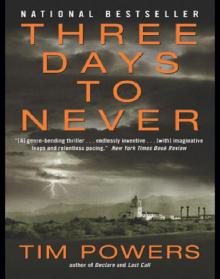 Three Days to Never: A Novel
Three Days to Never: A Novel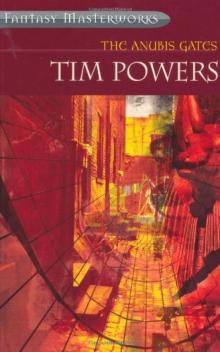 The Anubis Gates
The Anubis Gates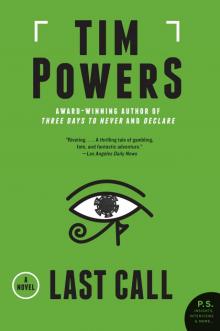 Last Call
Last Call Forced Perspectives
Forced Perspectives Strange Itineraries
Strange Itineraries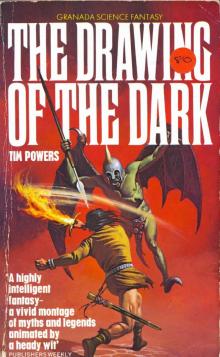 The Drawing of the Dark
The Drawing of the Dark Hide Me Among the Graves
Hide Me Among the Graves The Bible Repairman and Other Stories
The Bible Repairman and Other Stories Nobody's Home: An Anubis Gates Story
Nobody's Home: An Anubis Gates Story More Walls Broken
More Walls Broken The Skies Discrowned
The Skies Discrowned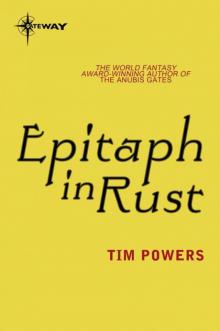 Epitaph in Rust
Epitaph in Rust Skies Discrowned and An Epitaph in Rust
Skies Discrowned and An Epitaph in Rust Nobody's Home
Nobody's Home Drawing of the Dark
Drawing of the Dark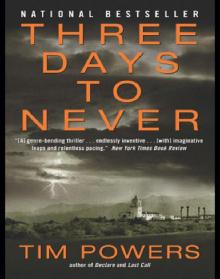 Three Days to Never
Three Days to Never